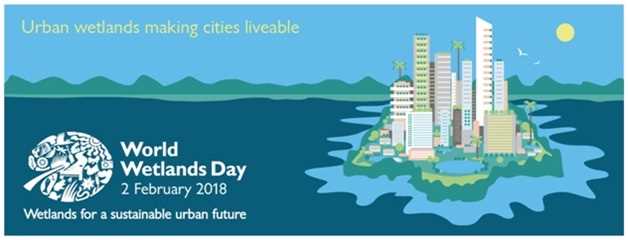The theme of the World Wetland Day, 2018, is “Wetlands for a Sustainable Urban Future”.

The ‘World Wetland Day’ (WWD) is celebrated every year on February 2nd, which represents the adoption of the Convention on Wetlands in the city of ‘Ramsar’ in Italy in 1971. The day is basically celebrated to generate awareness about the importance of wetlands for humans and for the planet as well. The World Wetland Day was first celebrated in the year 1972. The promotion of Wetland Areas by the Government and the Non-Government organization provide various benefits to the ecosystem like improve the habitats as well as provide a good habitat for various species, it saves the coastal areas against floods and storms, naturally filters water by breaking down or flushing out harmful pollutants.
Every year the World Wetland Day follows a different theme to generate awareness and work towards other different concerned areas. The theme for the year 2018, follows the various causes like wetlands in Urban areas make cities more livable. It reduces the chances of flooding in the cities, removes toxic substances and sedimentary from the water, the quality of downstream water will improve, as well as the overall health of the citizens. Wetlands also provide fiber for making crafts and recreational opportunities. But the lack of knowledge among people that how beneficial the Wetlands are causes the transformation of wetlands by the humans.
The Wetland Area have various benefits and contribute to economic value such as Clean Water, Timber, Fisheries, Peat, Wildlife Resources, and a good opportunity for improvement in Tourism. Whereas, the increasing demand for the Farming Land causes depletion of Wetland areas in some parts of the world. These Wetland areas are a good source of water storage, groundwater recharge, controls soil erosion, as well as retains Carbon, various nutrients, sediments, and pollutants.